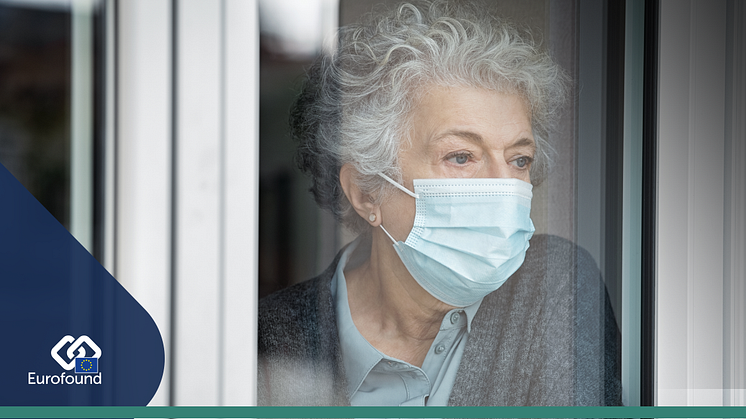
News -
One third of people aged 80+ did not leave home during COVID-19 outbreak
In summer 2020, 34% of people in the EU aged 80+ had not left home since the COVID-19 pandemic began, and 88% of people in this age group reported visiting family members less often. Although people of all ages became more at risk of mental health issues and loneliness during the pandemic, the impact was particularly severe on both young people and people aged 80+, with 23% of those aged 80+ reporting feeling sad or depressed more often in summer 2020 than before the pandemic.
Eurofound’s new report COVID-19 and older people: Impact on their lives, support and care captures the impact of the COVID-19 crisis on the quality of life of older citizens, including the impact on their well-being, finances, employment and social inclusion. The report adds to the increasing body of research provided by Eurofound on the impacts of the COVID-19 pandemic on different age groups.
Older people have been disproportionately impacted by the COVID-19 pandemic, with those aged 65+ accounting for 77% of COVID-19 deaths across Europe by November 2021. Many more suffered from severe illness, were hospitalised, or needed rehabilitation care. Eurofound’s research shows that, although the broad age group of 65+ reported better comparative well-being in some indicators than younger people, there is evidence of broad decline in quality of life for over 80s, and that people in this age group were hit particularly hard by isolation, declining well-being, and reduced opportunities for physical activity.
Social contacts decreased across the board in the early stages of the pandemic. Remote contacts substituted for face-to-face contacts, especially with relatives other than children. Although this decline in face-to-face contact was a strategy across the EU to manage the spread of the virus, different approaches at national level are reflected in the different levels of relative decline in social interaction. For example, in summer 2020 44% of people aged 50+ in Malta, and 34% in Croatia in Cyprus reported having not left home since the pandemic started, whereas this was just 2% in Denmark and 3% in Sweden.
In terms of income, older people faced decreases in income less often than young people, with pensions largely providing a stable income source. However, expenditure increases, such as those related to private transport and care needs caused problems for low-income groups, and feelings of income insecurity were widespread.
The report shows that many older people accessed e-healthcare during the pandemic, but half of those with access reported it did not fully meet their needs, and there was a continued strong preference for face-to-face consultation. There was also evidence that some older people faced barriers in using the technologies required to manage many aspects of life during the pandemic, including e-healthcare needs and remote social contact. For those in residential care, while many looked to use e-tools to stay in contact with friends and family, there was often not enough time or resources to facilitate this in practice.
Speaking on the publishing of the report, Eurofound Executive Director Ivailo Kalfin said, ‘The COVID-19 pandemic has had a profound impact on the lives of many older people across Europe, including contributing to loneliness, social isolation, physical inactivity and declining mental well-being. Unfortunately, the very oldest age groups are often under-represented in surveys and source data, this is particularly the case for those in care settings. This report is a vital contribution to the body of research on the impacts of COVID-19 and an important resource for policymakers in furthering recovery measures important for older citizens.’
Read more:
- Publication: COVID-19 and older people: Impact on their lives, support and care
- Topic page: Living conditions and quality of life


